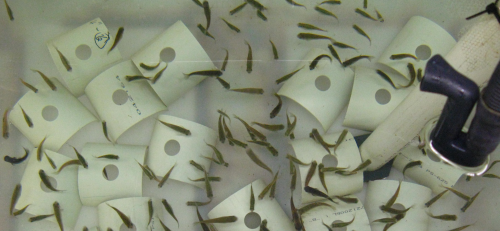It smells fishy: Copper prevents fish from avoiding danger

Fish fail to detect danger in copper-polluted water. A new study, to be presented at the meeting of the Society for Experimental Biology on the 5th of July, shows that fish cannot smell a danger odor signal emitted by other fish in waters contaminated with copper.
Research conducted by Dr Bill Dew at the University of Lethbridge in Canada looked for the first time at the effect of the metal contaminants nickel and copper on specific fish olfactory sensory neurons, and how these affect the fish's ability to detect and swim away from an odour released by other fish of the same species (conspecifics) when a predator attack takes place.
Dr Bill Dew said: "Our research shows that copper affects the function of a specific type of olfactory neurons in fish, preventing them from detecting important olfactory signals used to detect fish injured by predation."
Using a technique that measures the response of the olfactory system to odours, the researchers showed that copper and nickel affect the ability of different cells to detect odours. Furthermore, using a series of anti-predator trials, which measured avoidance of fish to a conspecific skin extract, the researchers found that fathead minnows exposed to copper do not avoid the skin extract, while unexposed and nickel-exposed fish do.
Dr Bill Dew said: "This means that fish in an environment contaminated with copper would not be able to detect compounds released during a predation event and potentially not avoid predators, while fish in a nickel contaminated environment would be able to detect these compounds and undertake predator-avoidance behaviours."
The fish olfactory epithelium (the fish's nose) is made up by olfactory sensory neurons and support cells. There are three known olfactory sensory neuron types, which bind and are activated by odourants in the surrounding water: cilated, microvillous, and crypt cells. Microvillous cells are the only ones that respond to L-alanine, and ciliated cells are the only ones that respond to taurocholic acid. By measuring the response of the olfactory epithelium to these two odourants, the researchers found that in fathead minnows and yellow perch, copper preferentially impairs ciliated cells, while nickel impairs microvillous cells only. This is the first study to connect a specific behaviour with a specific olfactory sensory neuron type.
More information: This work will be presented at 16:20 on Friday 5th July 2013.
Provided by Society for Experimental Biology















